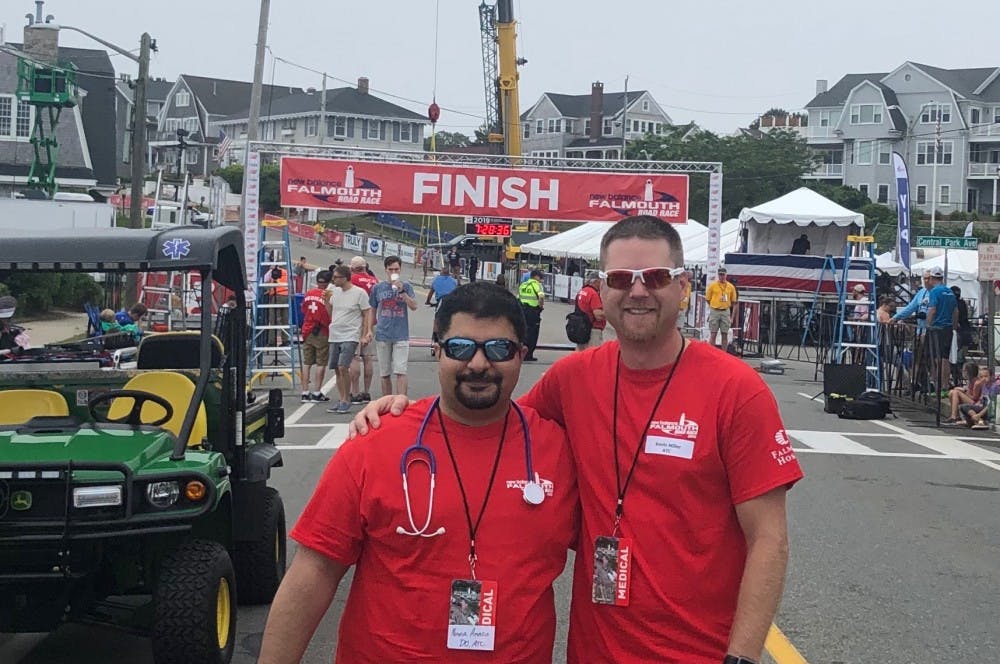CMU faculty members save 26 lives at Falmouth Road Race

Dr. Noshir Amaria and Dr. Kevin Miller at the finish line of the Falmouth Road Race. (Courtesy Photo | Noshir Amaria)
When Dr. Noshir Amaria and Dr. Kevin Miller went to the Falmouth Road Race in Massachusetts this summer, they didn't anticipate having to save 26 lives.
Amaria, an intercollegiate athletics team physician and College of Medicine faculty member, and Miller, a Herbert H. and Grace A. Dow College of Health Professions faculty member, volunteered to join the medical team of at least 100 people at the race.
Miller serves on the Kory Stringer Institute Science of Medical Advisory Board. His affiliation with the institute and interest in heat illnesses inspired him to work on the medical team, he then invited Amaria to join him.
The Aug. 18 race included close to 12,000 participants, who ran the seven-mile seaside course in an average of one hour and 13 minutes.
“Because the runners can run it very quickly, their body temperatures go up very quickly as well,” Miller said. “It’s a perfect storm for studying heat stroke, which is one of the three leading causes of death in athletes.”
Both Miller and Amaria were supposed to be working the medical tent at the finish line, but not enough physicians showed that day, so Amaria was on the course in a mobile unit Gator helping bring athletes to the closest medical tents.
The athletes were taken to the tents, had their temperatures taken and were treated accordingly; in most cases they were dunked in tanks of cold water.
"Of the 26 heat strokes we had, we only sent eight to the hospital for further evaluation," Miller said. "When you have people like this and you treat them correctly, they go about their day just fine."
Temperatures were taken with both ear and rectal thermometers. An ear thermometer may say 104 degrees and the rectal one would have 108.5 degrees, Miller said.
"Not only was the ear thermometer four-and-a-half degrees off, it was four-and-a-half degrees off in the worst possible direction," Miller said. "This can change the course of treatment."
After helping save 26 lives from heat stroke with temperatures up to 108.6 degrees, the two professors were reaffirmed with the university’s heat illness policies and their experience on managing the illness.
Since the university generally doesn’t see heat stroke – just sicknesses under the heat illness umbrella – it is hard to study and practice what is necessary in that scenario.
“I’ve seen a full-blown heat stroke once or twice before, but I did not manage it, I was an athletic trainer at the time,” said Amaria. “So to actually manage five at once in the tent that I was in, gave us so much experience in such a compressed amount of time. I got a class A education in, like, four hours.”
Miller has an environmental chamber at CMU to study appropriate procedures for heat illness.
“I can’t give my subjects real heat stroke, so the hottest I’ve ever taken a subject here at CMU is 104 degrees, which is quite different than 108.6,” Miller said. “The way that their symptoms manifest is very different, so to study real heat stroke, I can’t do that at CMU. We have to go to these natural races where people will do this to themselves because they want to win.”
Amaria and Miller said that even as newcomers to the race, everyone welcomed them to the medical team with open arms.
"There were people from all around the country; we were the only two guys from Michigan," Amaria said. "I was blown away by the hospitality. People know you are there to help others, (so) it kind of endears you to them a little bit."
The medical team had people with a variety medical experience, including EMTs, physical therapists, physicians and students.
"It shows how medical professionals can work together for the betterment of people," Miller said. "A lot of times athletic trainers, physicians, nurses and EMTs very sparsely interact with each other at one time, but you had people all across the medical spectrum working together to save lives."
After using this year’s race to get a lay of the land, they plan to go back next year with a research idea of their own and learn how to treat people with heat stroke more effectively.






